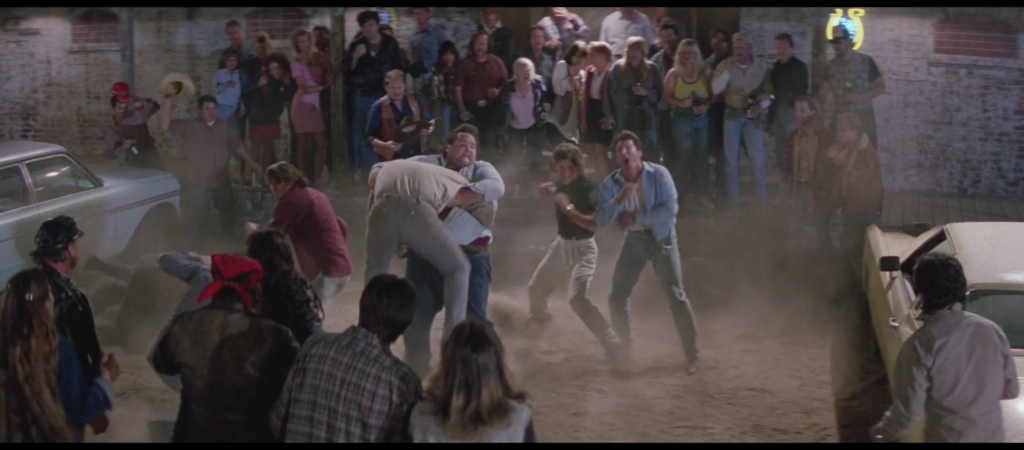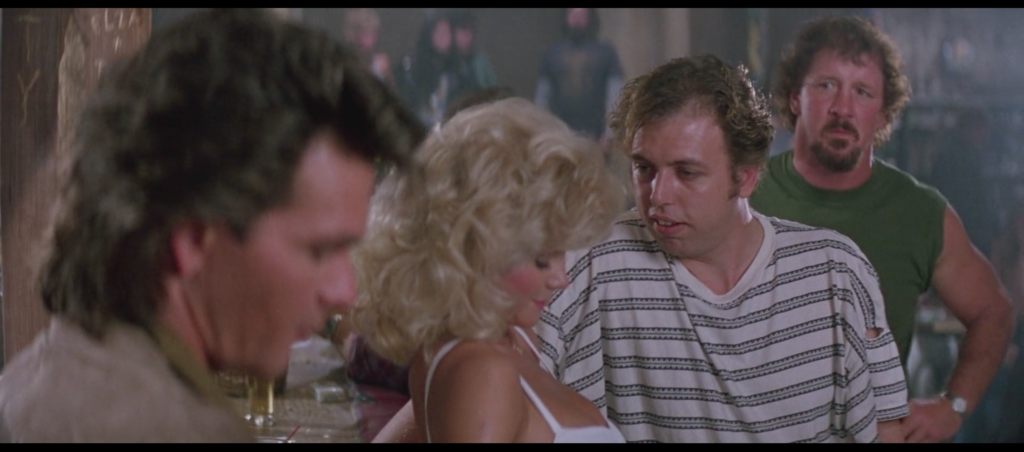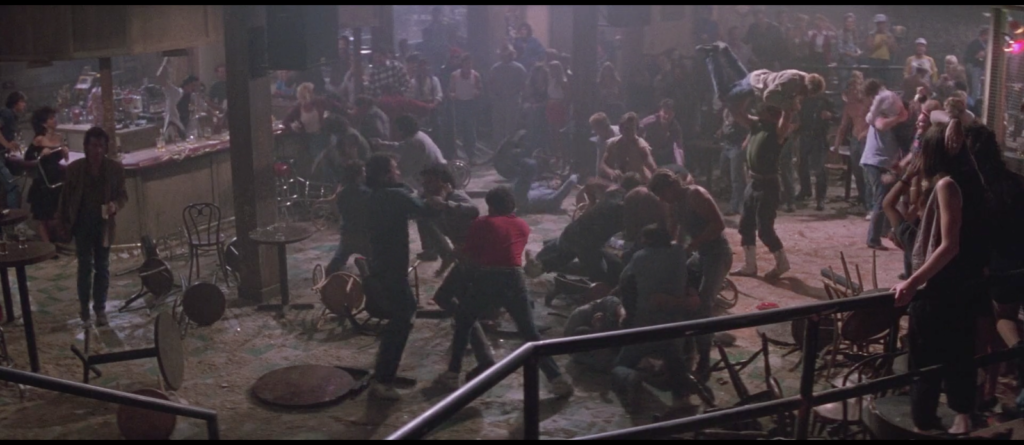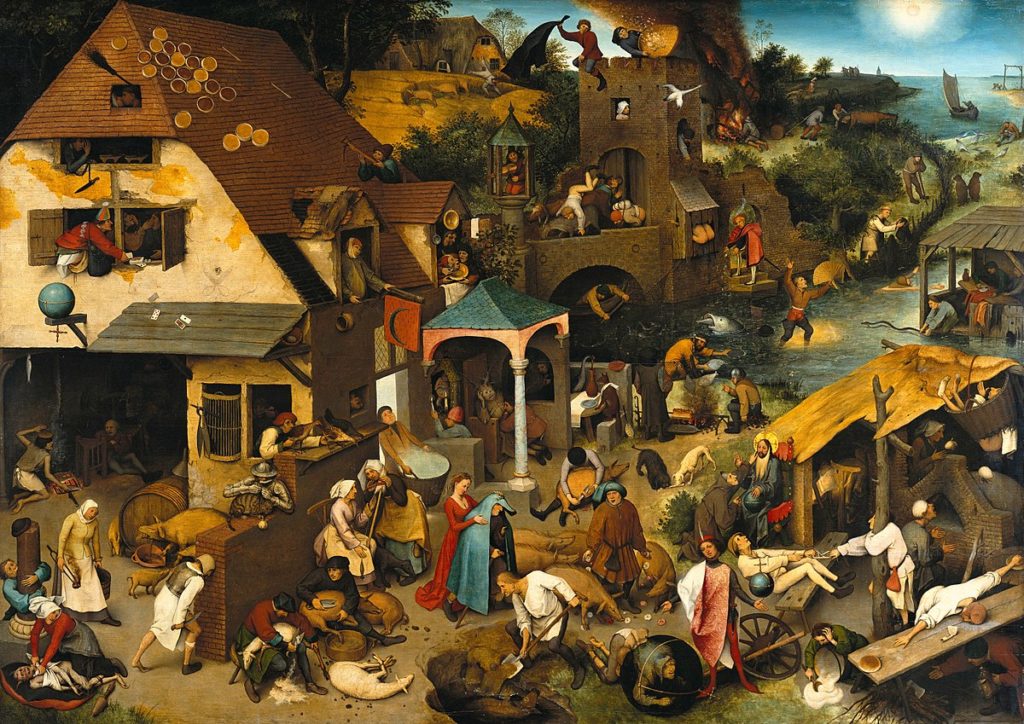Posts Tagged ‘tableau’
137. Tableau IV
May 17, 2019“I think that if you’re gonna write about war and violence, show the cost. Show how ugly it is. Show both sides of it. On the other side—which sometimes gets me in trouble from the other side of the political spectrum—is the glory of war, which those of us who are opposed to war and would rather not have war tend to forget about, or try to pretend it doesn’t exist. But if you read the ancient historical sources, people are always talking about the glory of war, the banners that stirred the heart, the banners in the wind.” —George R.R. Martin
051. Tableau III (Nipple to Nipple)
February 20, 2019Here in the Double Deuce, after Dalton’s arrival, prior to The Agreement and the subsequent bar-destroying brawl, things are proceeding as one assumes they always proceed. Denise, Jasper’s sole indication that there is a non-Jasper culture out there to which one can aspire, glides up to the bar to ask Pat McGurn (John Doe, cofounder of X, lest we forget) for a “vodka rocks.” Enter the Barfly, and this is actually how he’s credited, “Barfly,” played by Frank Noon. In a film teeming with barflies he is selected as the representative specimen. This absolute slob, I mean maybe the most gormless motherfucker in the whole film, this asshole sidles up to her and says “Hey, Vodka Rocks, what do you say you and me get nipple to nipple.” I hesitate to call this pickup line a euphemism, because it’s actually much more vulgar than describing the sex act outright. Getting nipple to nipple is a phrase that can only make one feel bad about having sex, or wanting to have sex, or being capable of having sex, or being part of a species that propagates itself by having sex. It embarrasses me anew every time I hear it. Goof coming out of his well armed with his quip to slutshame mankind. Point is it’s not happening for this turkey. Denise looks down in contempt, unconsciously mirroring the way Dalton, whose hair is only slightly less magnificent than hers, looks down in disapproval. Then she looks up and, this being Road House, shoots the guy down in the strangest possible way. “I can do that without you,” she says, before turning away and giving Dalton an appreciative once-over (more like a thrice-over actually, she is hot to trot for our hero) in the process. The reasonable interpretation of this rejoinder is that Denise can somehow aim her breasts at one another so that her nipples can touch, a pincer movement if you will. I choose to believe she thought fast and decided to shoot this goofy down by saying something even weirder than he did. Either way, and I hope you’re sitting down for this, he does not take rejection well. See Morgan back there? He’d been leaning on the bar in the background unseen until the dirtball mooselipped chickendick made a pass at Denise. (Do people make passes at other people anymore? When I was a kid Three’s Company and The Golden Girls had me believing that’s all anyone did as an adult. “He made a pass at me” is something I’ve never heard a human being say outside of a multi-camera sitcom. Anyway) The moment after “nipple to nipple” dribbles out of his mouth, Morgan pops into the frame from behind, like a fucking jack-in-the-box. It’s one of my favorite little moments of abject stupidity in the movie. On his worst day in the ring, Terry Funk couldn’t oversell a bump half as hard as he oversells Morgan overhearing someone hit on his secret boss’s girlfriend and getting mad about it. Of course Morgan is always mad. He’s an orneriness elemental. And he puts it to good use when Mr. Nipple angrily grabs Denise by the shoulder. Morgan grabs him by the shoulder, punches him in the gut, and tosses him into a table full of patrons, spilling him and them and the table and the drinks on it and several bystanders to the ground in the process. Why this doesn’t lead to an apocalyptic bar-wide battle royale is beyond me given that The Agreement ends in a nearly identical fashion, but at the very least it gives Dalton, serene and detached, an eyefull of Morgan’s modus operandi. This is clearly a bouncer who will need to be bounced. So! Beautiful, slightly weird woman. Ugly, very weird man. Angry, very angry bouncer. Knocked-over tables. Knocked-over patrons. Pat McGurn. The malign influence of Brad Wesley behind it all. Dalton has just gotten nipple to nipple with the Double Deuce. It’s not pretty.
025. Tableau
January 25, 2019Though Dalton gets stabbed within the first few minutes of Road House, it would be incorrect to refer to the incident as a fight. He weathers the cut with stoic grace, lures the wielder of the blade into the parking lot of the Bandstand under the false pretense of giving him the honor of a mano a mano throwdown, and then walks back inside, closing the gates of paradise behind him with a row of mountainous bouncers.
The real first fight occurs about 15 minutes in, when Dalton first arrives at the Double Deuce. Let us leave aside the manner in which the fight begins, for now; suffice it to say it involves the violation of a verbal contract and a subsequent falling-out between the negotiating parties. Let us also avoid discussion of the fight’s particulars, each of which will likely receive an entry of its own. Here our focus is on the fight’s gestalt. As much as the Shirtless Man or the Four Car Salesmen or the Bouncer Fame Index, it is an indication of the kind of movie you’re watching, and the most visceral and ambitious one at that. And it indicates this: You are watching a movie in which barfights achieve the colossal scale and cacophonous visual intensity of a painting from the Flemish Renaissance.
While, again, avoiding the instigating incident and the individual fight choreography beats, the effect of the first fight is intoxicating—a vertiginous ramping-up of wanton physical stupidity and destruction, from a starting point that is incredibly stupid itself, that simulates the effect of consuming an heroic amount of intoxicants in a time short enough to be the length of a song from Wire’s Pink Flag.
The first time I watched Road House I’d heard about it for a couple of years from the friends who wound up introducing me to it, but really had no idea what the fuss was about. By the time the first fight was over I wondered no longer. While I imagine there are those who do not give themselves over to the movie after this scene, I was not one of them, nor do I truly understand what it would take to be one of them. There’s no resisting the howitzer blast of shattered bottles, smashed tables, flying bodies, and punched heads you witness here, nor the rogues gallery of one-off stuntpersons who produce them.
And while Dalton himself stays out of the fray, watching it all unfold with the sangfroid only America’s second most famous bouncer could muster, you the viewer are afforded no such luxury. You pinball around with the camera as every act of stupendously dumb violence is rubbed right in your face. As a collection of individual moments, shots, characters, punches in the head, it’s truly impressive.
But when the camera pulls back and the full scale of the devastation is revealed for the first time? Breathtaking. Staggering. Clarifying. In that one moment you mentally whip-zoom from the trees to the forest, the way you might look back at a particularly harrowing stretch of events in your life and think “my god, how did I ever make it through?” The parts overwhelm moment to moment. The whole overwhelms on a whole other level, yet none of the parts are concealed. Everything is happening.
And you’ve emerged on the other side, with roughly a Tilghman’s eye view of the conflagration. You see the magnitude of the task Dalton has taken on, even as he casually strolls through the still-raging slobberknocker to confer with the bar’s owner. You see the movie you’re about to spend another hour and a half watching, itself a collection of individual moments, shots, characters, and punches in the head—just as chaotic as this one image, and just as cohesive a statement.




